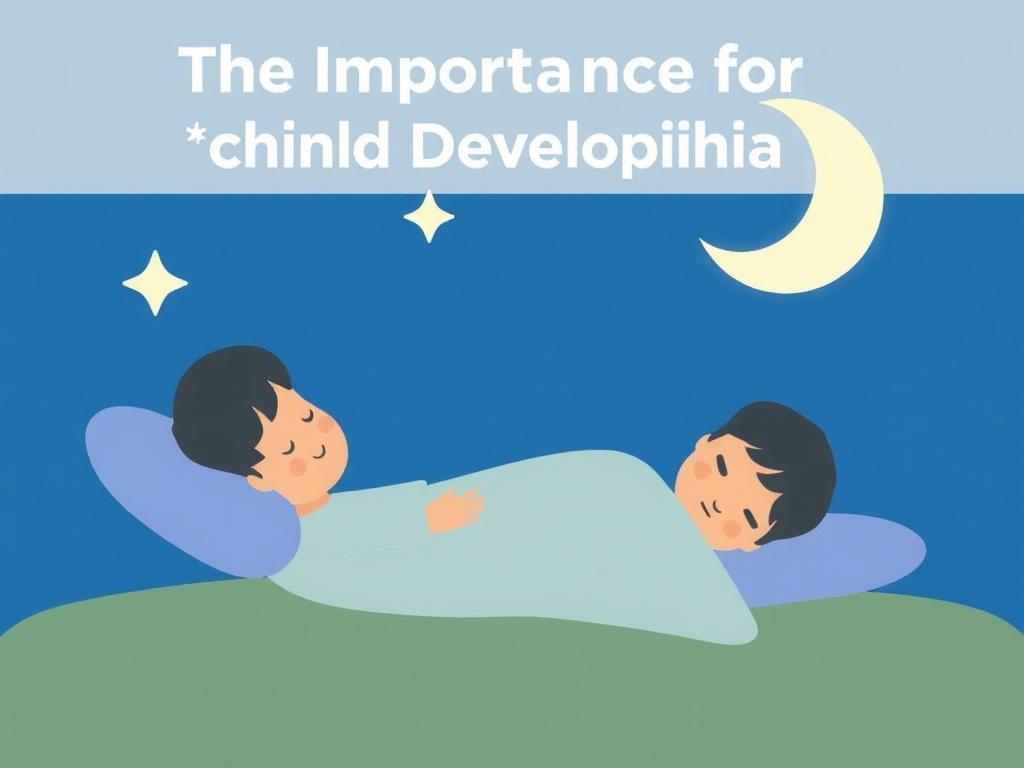SQLITE NOT INSTALLED
When we think about what it takes for children to grow into healthy, happy, and smart adults, we often focus on diet, education, and physical activity. However, one essential piece of the puzzle sometimes gets overlooked: sleep. Sleep plays a fundamental role in child development, influencing everything from brain function and emotional wellbeing to physical health and growth.
In this deep dive into the importance of sleep for child development, we will explore how sleep affects various aspects of a child’s growth, the science behind it, and practical tips parents can use to ensure their children get quality rest. Understanding these connections helps caregivers prioritize sleep as much as they do nutrition and learning activities.
Why Sleep Matters So Much in Early Childhood
Sleep isn’t just a passive state when the body lies still; it’s an active period that supports vital processes in young children. Rapid brain development, hormone release, and memory consolidation all occur when a child sleeps. Without sufficient sleep, these processes are disrupted, which can slow development and create challenges that extend into adolescence and even adulthood.
During childhood, particularly infancy and the preschool years, sleep facilitates brain plasticity—the brain’s ability to adapt and reorganize—which is crucial for learning new skills and absorbing information. This is why sleep has such a profound effect on cognitive development and academic success. Studies consistently show that children who get enough restful sleep perform better in school, have greater attention spans, and exhibit improved problem-solving abilities.
In addition to learning and cognition, sleep supports physical growth. The body releases growth hormones primarily during deep sleep stages, making adequate rest crucial for proper height and weight development. Moreover, sleep strengthens the immune system, helping children fight off illnesses more effectively and recover faster when sick.
How Sleep Influences Cognitive Development in Children
The brain’s development is extraordinary during the initial years of life. For instance, infants experience rapid neural growth and synapse formation, creating the foundation for later learning and memory. Sleep plays a vital role in supporting these neural processes.
One of the most important jobs sleep does for cognitive development is helping the brain consolidate memories. During rapid eye movement (REM) sleep and deep non-REM sleep, the brain processes information acquired throughout the day, transforming short-term memories into long-term storage. Without this crucial step, learning is fragmented, and new information struggles to stick.
Research involving school-aged children reveals that those with disrupted or inadequate sleep show impaired attention, memory deficits, and poorer academic performance. Additionally, toddlers and preschoolers who don’t get enough sleep often have difficulties regulating emotions, increasing tantrums and stress-related behaviors.
Table: The Connection Between Sleep and Cognitive Functions in Children
| Sleep Stage | Brain Activity | Impact on Cognitive Development |
|---|---|---|
| Non-REM Deep Sleep | Growth hormone release and brain restoration | Supports memory consolidation, learning, and physical growth |
| REM Sleep | Active brain activity similar to wakefulness | Enhances creativity, problem-solving, and emotional processing |
The Role of Sleep in Emotional and Behavioral Development
Sleep does much more than enhance cognition and physical growth—it also strongly impacts emotional regulation and social behavior in children. When children are sleep deprived, they often become more irritable, less patient, and prone to mood swings. These emotional disturbances can affect relationships with family members, peers, and teachers.
Furthermore, lack of sleep has been linked to increased risks of developing anxiety and depression during childhood and adolescence. The brain struggles to manage stress hormones properly when sleep is inadequate, leading to heightened sensitivity to everyday stress. This can cause problems with concentration, social withdrawal, and even aggressive behavior.
Parents often observe that children who don’t sleep enough have difficulty following rules or controlling impulses. In many cases, these behaviors mimic symptoms of Attention Deficit Hyperactivity Disorder (ADHD), though chronic sleep deprivation itself can cause or worsen such symptoms. Supporting healthy sleep habits can be a powerful strategy for improving behavioral issues and emotional wellbeing in children.
Promoting Healthy Sleep Patterns: Key Tips for Caregivers
Given the importance of sleep for child development, parents and caregivers should be proactive in establishing healthy sleep routines. Here are some effective strategies that promote good sleep hygiene in children:
- Keep a Consistent Bedtime: Children thrive on routine. Going to bed at the same time every night helps regulate their internal body clocks.
- Create a Relaxing Pre-Sleep Environment: Dim the lights, limit screen time, and engage in calming activities like reading or gentle music.
- Ensure Sleep-Friendly Conditions: A quiet, cool, and dark bedroom contributes to better rest.
- Limit Caffeine and Sugar Intake: Especially in the hours before bedtime, stimulants can interfere with sleep onset.
- Allow Physical Activity During the Day: Regular exercise promotes deeper sleep; however, vigorous activity should end a few hours before bedtime.
These habits, when established early, build a foundation for lifelong sleep health that continues to support development well into adulthood.
How Much Sleep Do Children Need? Age-Based Guidelines

It’s important to recognize that sleep needs vary significantly depending on a child’s age. Infants, toddlers, schoolchildren, and teenagers all have different requirements to support their unique developmental stages.
Below is a general guideline regarding recommended sleep durations per 24 hours by age group, based on recommendations from pediatric health organizations:
Table: Recommended Sleep Durations by Age Group
| Age Group | Recommended Sleep Duration | Comments |
|---|---|---|
| Newborns (0-3 months) | 14-17 hours | Includes both night and daytime naps |
| Infants (4-11 months) | 12-15 hours | Multiple naps plus night sleep |
| Toddlers (1-2 years) | 11-14 hours | Typically one or two naps per day |
| Preschoolers (3-5 years) | 10-13 hours | Transitions toward fewer naps |
| School-Age Children (6-13 years) | 9-11 hours | Usually no daytime naps required |
| Teenagers (14-17 years) | 8-10 hours | Susceptible to sleep deficits due to social and academic pressures |
It’s essential to understand that while these ranges offer a helpful framework, individual children may fall slightly outside these ranges and still function well. The key is the quality of sleep and whether the child wakes up refreshed and functions optimally during the day.
Consequences of Poor Sleep on Child Development

When children consistently receive inadequate or low-quality sleep, the consequences can affect every aspect of development. Below we outline key areas negatively impacted by poor sleep among children:
1. Cognitive and Academic Impacts
Children who don’t sleep enough may experience difficulties with attention, memory, and executive functioning, which are critical for academic success. Sleep deprivation impacts the brain’s ability to process and retain new material, leading to lower test scores and reduced classroom participation.
2. Emotional and Behavioral Challenges
Insufficient sleep often leads to increased irritability, anxiety, and impulsive behaviors. In some cases, chronic sleep problems contribute to mood disorders or exacerbate conditions such as ADHD. Behavior problems stemming from poor sleep can also strain relationships between children, parents, and teachers.
3. Physical Health Risks
Sleep deficiency disrupts hormone regulation, including hormones responsible for hunger and metabolism. This can heighten the risk of obesity and related conditions like diabetes. Furthermore, ongoing lack of sleep weakens the immune system, making children more susceptible to infections.
4. Growth and Developmental Delays
Because growth hormones are primarily secreted during deep sleep phases, inadequate rest can stunt physical growth and delay developmental milestones. This delay can manifest in slower motor skill development or lower energy levels compared to peers.
How Societal Factors Influence Child Sleep Patterns

In today’s fast-paced world, various societal influences often interfere with children’s sleep routines. Technology, school schedules, and extracurricular demands affect how much and how well children sleep.
Screen Time: Tablets, smartphones, and televisions emit blue light that disrupts melatonin production, the hormone that helps regulate sleep. Using screens right before bed can delay sleep onset and reduce sleep quality.
School Start Times: Many schools begin early in the morning, especially for adolescents who naturally tend toward a later sleep-wake cycle. Early start times can shorten overall sleep duration and lead to chronic sleep deprivation.
Extracurricular Activities: While physical activity is good, busy schedules with after-school sports or tutoring can push bedtimes later, making it difficult for children to get the recommended amount of sleep.
Balancing Modern Life with Healthy Sleep Habits
To support good sleep despite these challenges, families can implement practical approaches such as:
- Setting firm boundaries around screen use in the evening
- Advocating for later school start times, especially for teenagers
- Planning extracurricular activities earlier in the day when possible
- Encouraging calm bedtime routines that minimize stress
These strategies help ensure that children get the rest they need without sacrificing opportunities to learn and grow in other areas.
Common Sleep Disorders in Children and When to Seek Help
Sometimes, despite best efforts, children may struggle with sleep due to underlying disorders. Some common pediatric sleep disorders include:
- Sleep Apnea: Characterized by interrupted breathing during sleep, leading to frequent awakenings and poor sleep quality.
- Insomnia: Difficulty falling or staying asleep at night despite adequate opportunity.
- Restless Leg Syndrome: An uncomfortable urge to move the legs, interfering with falling asleep.
- Behavioral Sleep Problems: Including bedtime resistance or frequent nighttime awakenings often related to anxiety or developmental conditions.
If you suspect a sleep disorder, consult a pediatrician or sleep specialist. Untreated sleep disorders can cause long-term issues that affect your child’s wellbeing and development.
Signs That a Doctor Should Evaluate Your Child’s Sleep
- Excessive daytime sleepiness despite a reasonable bedtime
- Loud snoring or pauses in breathing during sleep
- Difficulty waking in the morning or frequent nightmares
- Signs of hyperactivity, inattentiveness, or mood swings related to sleep issues
Early diagnosis and treatment are important to restore healthy sleep patterns and reduce developmental impacts.
Conclusion: Prioritizing Sleep as a Cornerstone of Healthy Development
As we have explored, the importance of sleep for child development cannot be overstated. From fueling brain growth and memory retention to regulating emotions and supporting physical health, sleep acts as a foundation upon which children build their cognitive, emotional, and physical wellbeing.
Parents, educators, and healthcare providers must work together to recognize sleep as a priority equal to nutrition and exercise. By promoting healthy sleep habits, understanding children’s sleep needs by age, and addressing problems early, we can give children a greater chance to reach their fullest potential.
Remember, investing in good sleep today means investing in a brighter, healthier future for every child.
